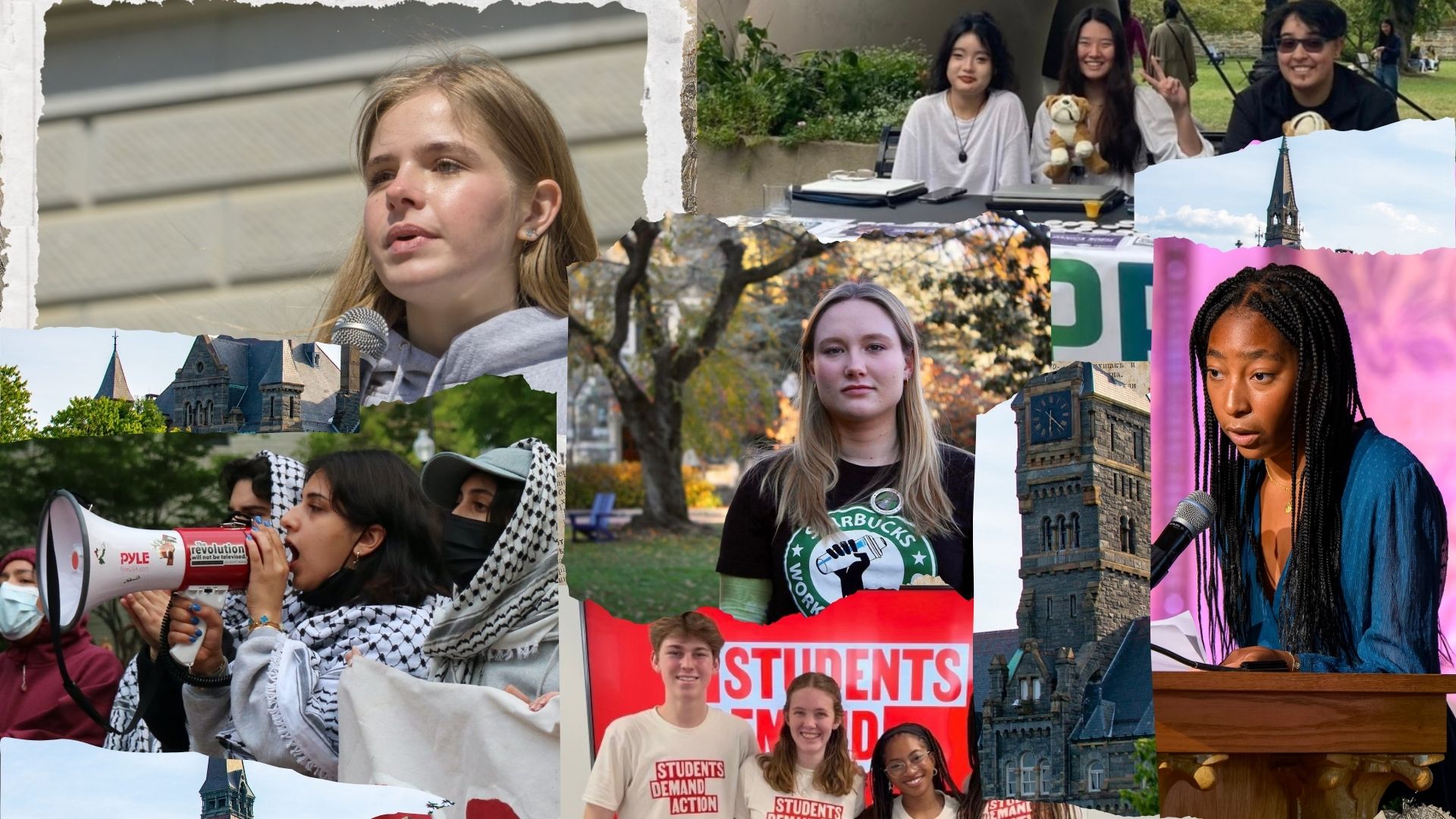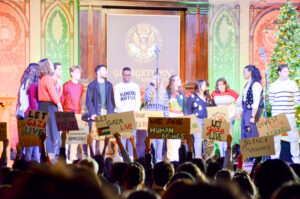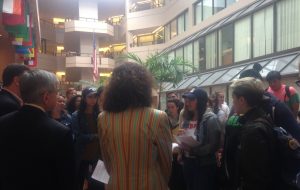Even before she got to Georgetown, Kessley Janvier (CAS ’25) knew she’d find herself holding the university accountable through activism.
“I was joking to some of my friends, I’m going to this prestigious university, and I know that I’m just going to end up protesting them in some way, shape, or form,” Janvier said.
Janvier isn’t the only one. As with many other universities, student activism at Georgetown is widespread, ranging from advocacy on local and university-based issues to large, global conflicts. Because of Georgetown’s location in the nation’s capital, as well as the students it attracts, activism and organizing hold a unique space on campus.
Janvier is just one example of many students who have brought their passions from high school and prior experiences advocating for issues they care about to campus. From gun violence prevention to Palestinian liberation to workers’ rights, student activists shared with the Voice how getting involved at Georgetown helped them continue their passions, elevate them to a national stage, and find community all while starting college.
Janvier came to campus unsure of what advocacy groups she wanted to be a part of.
“I knew I was going to end up organizing in some degree, shape, or form, but when I was a freshman, I definitely didn’t know what that looked like,” Janvier said. “I’m a member of several marginalized groups, I go to a PWI [Predominantly White Institution], it was a priority for me to really meet people that were similar to me, and build community that way, so that I wouldn’t feel isolated.”
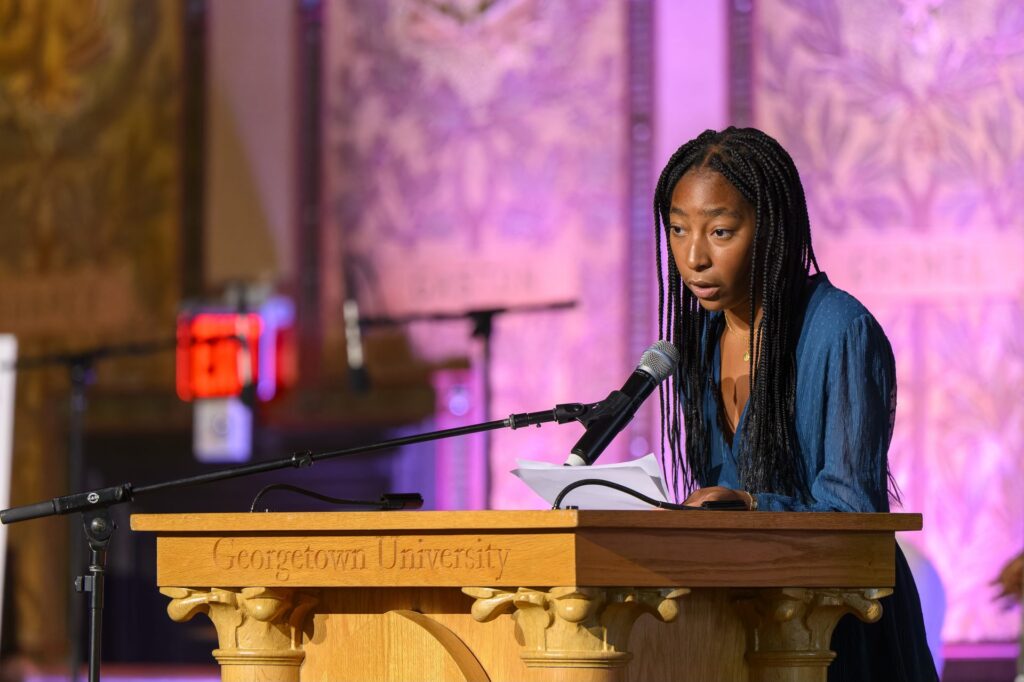
Photo courtesy of Rafael Suanes Kessley Janvier speaking in Gaston Hall.Photo courtesy of Rafael Suanes
During her freshman spring, Janvier attended The Cookout, a university-sponsored retreat for Black students by Black students. There, she met several students involved in Hoyas Advocating for Slavery Accountability (HASA), a group that advocates for the remembrance of the more than 314 human beings that Georgetown University owned and sold, and lobbies for reparations for their thousands of descendants.
Janvier was already interested in work surrounding reparations for slavery, and meeting several seniors involved in HASA inspired her to dive in. She emphasized that finding community is an important piece in deciding which groups to become involved in.
“Part of the reason I joined [HASA] freshman spring was because I thought the people in it were cool—it was that simple,” Janvier said. “They treated me well, and I thought the issue was interesting, so I came back.”
Unlike Janvier, Elinor Clark (CAS ’27) came to Georgetown with a very clear picture of what she wanted to be involved in. When Clark was only 16, she unionized a Starbucks.
“I got involved in the Starbucks campaign my junior year of high school,” Clark said. “I had been working at the Starbucks in my area for about a year at that point, and I heard some news come out of Buffalo that several stores there had voted to form a union, and I read more into it and learned of the atrocious union busting that Starbucks had been carrying out.”
After reaching out to union organizers in Buffalo, Clark was told that the best way to help their unionization efforts was to unionize her own location. A year later, Clark had not only unionized her Starbucks, but received national media attention for doing so, all while completing her senior year of high school and applying to college.
Once she got to Georgetown, she knew her work wasn’t done.
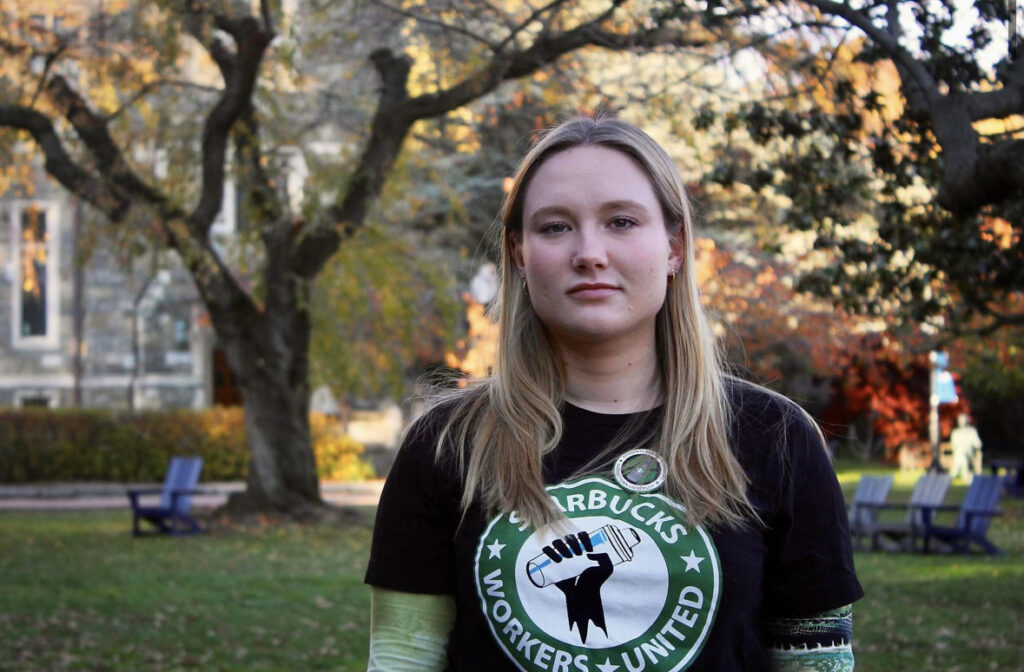
Photo courtesy of Dave Jamieson for HuffPost and Elinor Clark Elinor Clark standing on Copley Lawn in a Starbucks Workers United shirt.Photo courtesy of Dave Jamieson for HuffPost and Elinor Clark
“After a lot of ups and downs, I left Starbucks my senior year of high school and came to Georgetown and decided that I wanted to continue with the workers’ movement, and heard the news out of Cornell that they had just voted to not renew their contract with Starbucks, and got inspired,” Clark said.
Clark is now a lead organizer with Georgetown Students Against Starbucks, a group of students lobbying university administration and its subcontractor, Aramark, to cut ties with Starbucks and remove their location from campus in response to their union-busting tactics. She also organizes with the Georgetown Coalition for Workers Rights (GUCWR), which advocates for labor equity for workers at Georgetown and across D.C.
Reflecting on her freshman year, Clark found that continuing her work from high school not only helped her transition to college, but helped to find a community of her own.
“I felt like I could make a real change in individuals’ lives,” Clark said. “Having found the Coalition for Workers’ Rights and other people who are so passionate about workers’ rights has been one of the most formational pieces of my time at Georgetown so far.”
For others, activism has provided community and support when faced with the loss of family members. Selina Al-Shihabi (SFS ’26) is a board member of Georgetown Students for Justice in Palestine (SJP) and is Palestinian herself. After Hamas’ attack on Israeli civilians on Oct. 7 and Israel’s invasion and bombardment of Gaza, Al-Shihabi’s activism became a lifeline.
“Many of my family members were killed in Gaza, and that really drew me further into Students for Justice in Palestine. I was already on the board of Students for Justice in Palestine, but it even made me more connected to that work,” Al-Shihabi said. “It really really became one of the reasons that I could get out of bed in the morning, was to do my activism and to do activism at Georgetown.”
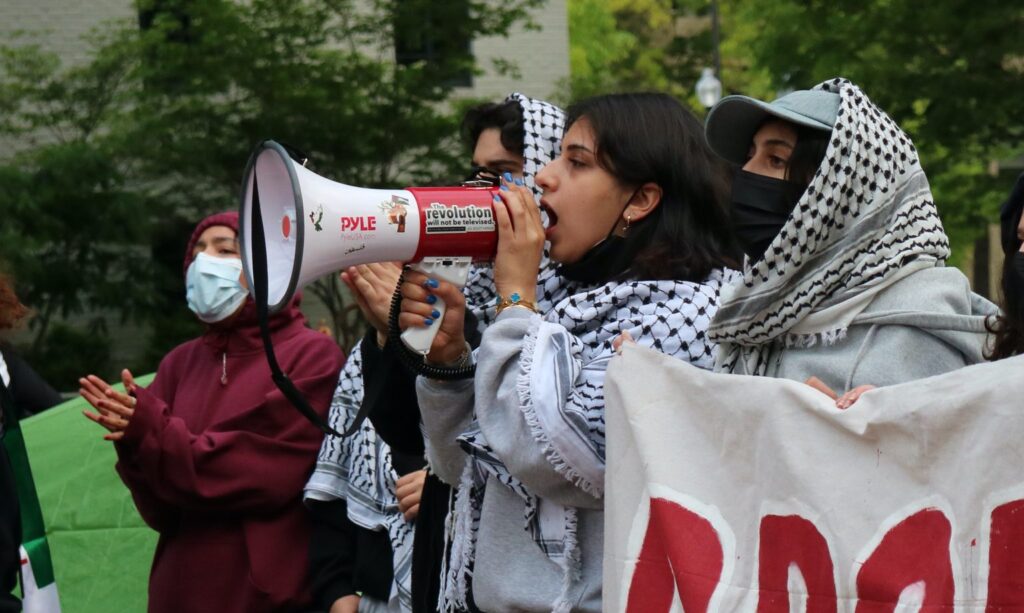
Photo by Eddy Binford-Ross Selina Al-Shihabi speaks at a protest in The Popular University for Gaza, a student encampment at George Washington University in May 2024.Photo by Eddy Binford-Ross
As Al-Shihabi waded through grief and feared for her family members living under constant attack, her work on Georgetown’s campus made her feel connected to her family, her culture, and herself.
“The only times that I would really feel like myself and I would really feel happy was when I was giving a speech at a protest,” Al-Shihabi said. “There would be days where it would be really hard for me to get out of bed to go to class, but then when it came to hanging up flyers for SJP, I would literally spend two hours just going around campus hanging up flyers, raising awareness [about] the genocide that was going on, and it was something that gave me a sense of purpose.”
Emma Vonder Haar’s (CAS ’26) activism was also inspired by tragedy. When she was nine years old, she witnessed a shooting.
After watching countless other mass shootings take place across the country, Vonder Haar knew she couldn’t sit back. In 2018, she joined the Students Demand Action (SDA) chapter as an 8th school student in her hometown of Louisville, Kentucky. SDA is a national, student-led nonpartisan organization seeking to reduce gun violence. Just six years later, Vonder Haar founded Georgetown’s SDA chapter.
“Students Demand Action national told me that there was another Georgetown student that had been a leader in high school,” Vonder Haar said. “They connected us and we were like, let’s get started here—we’re in the nation’s capital.”
For Vonder Haar and other leaders in Georgetown SDA, being in D.C. has afforded them the opportunity to advocate for gun violence prevention on the federal level. Vonder Haar was invited to the White House Rose Garden in September for President Biden and Vice President Harris’ announcement of the creation of the first ever White House Office of Gun Violence Prevention. Vonder Haar has spoken to many national leaders to advocate for common sense gun reform, but the conversations with those from her own state, Kentucky, have meant the most.
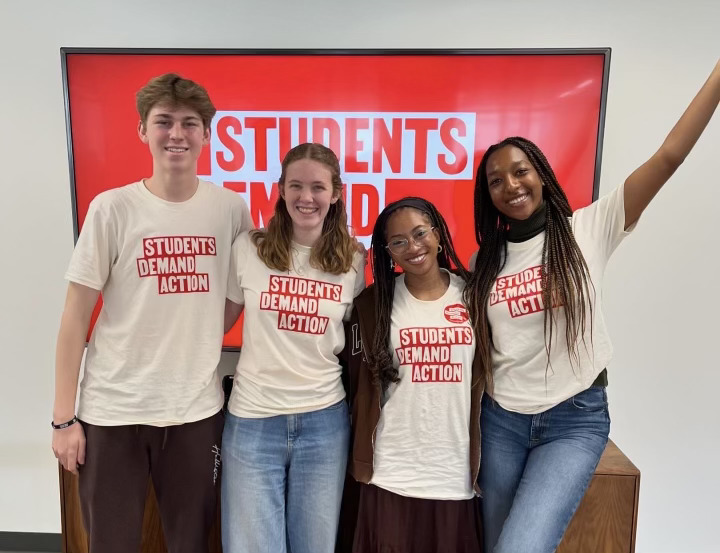
Photo courtesy of Emma Vonder Haar Emma Vonder Haar and other organizers at a Students Demand Action Event.Photo courtesy of Emma Vonder Haar
“This year, for our annual conference, we were in D.C., and I was with the Kentucky delegation and I was our leader because I know both D.C. and Kentucky,” Vonder Haar said. “We got to meet with six of our eight elected officials, at least, their offices, including Senator McConnell and Senator Paul’s offices, which would not have happened six years ago. Senator McConnell’s office would not have given us the time of day.”
Like Vonder Haar, other students who were organizers before Georgetown l have remained engaged in their home communities from the Hilltop. Elizabeth Foster (CAS ’27) is from Beaufort, South Carolina, where she led efforts to keep banned books in school libraries. While she has joined groups like GU Prison Outreach and Georgetown’s chapter of the ACLU, she still spends time organizing for her hometown.
“When I’m home, I’ve gone to the state house almost every break, talking about anti-trans healthcare legislation and censorship legislation and anti-DEI legislation,” Foster said. “I’ve also done informative Zooms from my dorm room that are still, again, connecting with people local to my hometown in my home state.”
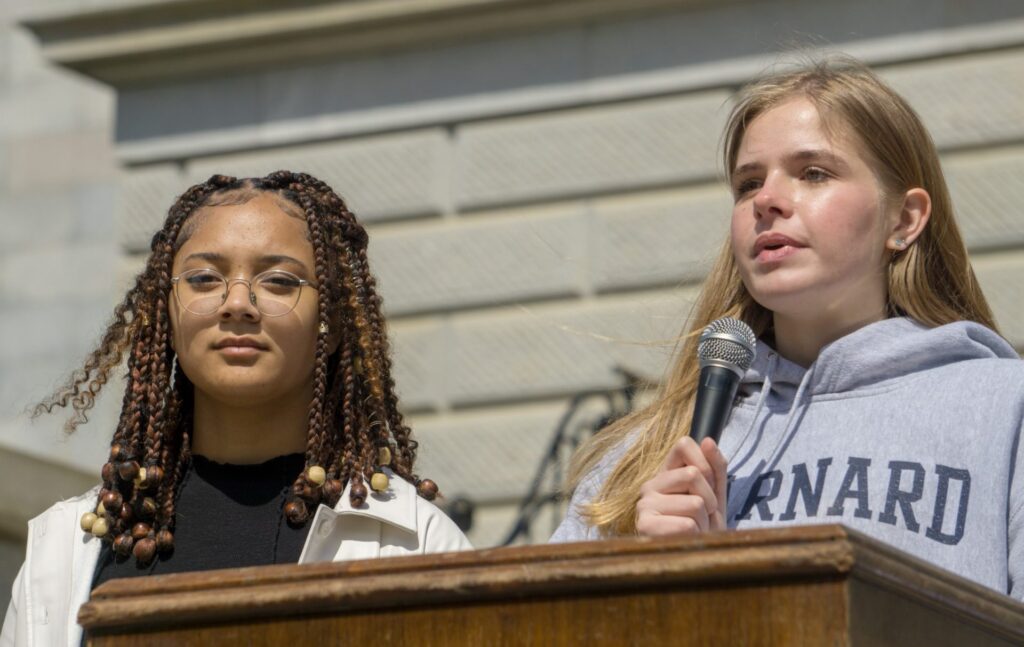
Photo courtesy of Elizabeth Foster Elizabeth Foster speaking outside of the South Carolina State Capitol in support of healthcare for transgender minors.Photo courtesy of Elizabeth Foster
Coming from a southern community to an institution like Georgetown, Foster said she worried about leaving advocacy efforts at home unfinished. Staying involved with her work in South Carolina has helped her transition to college and stay connected to her hometown.
“I think there’s this sense among people who are involved in advocacy in high school who go away for college, that it kind of feels like you’re leaving your hometown or your home state in a state of turmoil, and sometimes guilt can accompany that,” Foster said. “Being able to continue doing it on breaks and even from school has helped kind of ease that for me, and I can still feel involved and connected to my home state, even while I’m at Georgetown.”
For Foster and others, getting opportunities to advocate for causes across the country while at Georgetown has been gratifying. However, getting involved in activism at a new school can be daunting.
Gisell Campos (CAS ’25), co-president of GU Pride and tutor at the D.C. Schools Project (DCSP), which helps immigrant and refugee students learn English, stressed that though there are many Georgetown students who are successful and experienced in organizing, new students and those with little experience shouldn’t feel intimidated jumping in once they arrive to campus.
For Campos, getting involved in activism for queer liberation and immigrants’ rights was natural, given their background.
“These were parts of me that I already very strongly identified with,” Campos said. “Being queer and having immigrant parents, these were things that I was already very passionate about. So at no point did I feel like I had to be intimidated by anyone who had an impressive history of advocacy because these were already things that represented me.”
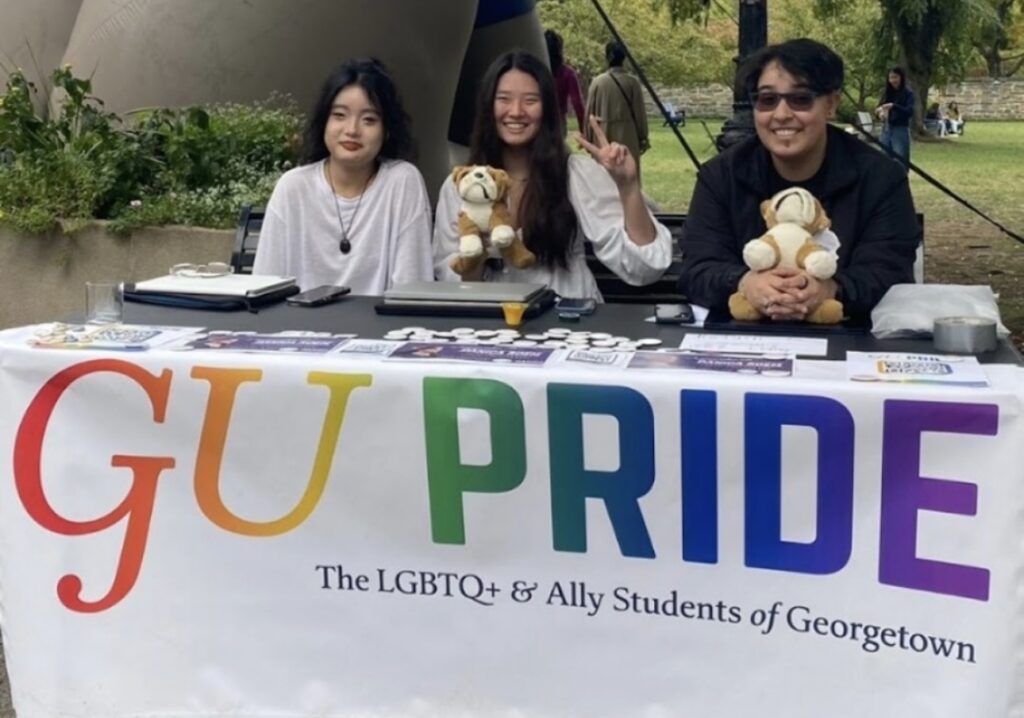
Photo courtesy of Gisell Campos Gisell Campos and other members of GU Pride table in Red SquarePhoto courtesy of Gisell Campos
Campos found that getting involved in organizations like GU Pride and DCSP was very accessible for new students, in part because these groups have infrastructure and leadership available to support new students and allow them to find their place in the community.
“What really helped me was that the two organizations that I’ve so far been the most involved with have extensive histories of activism, so I was already kind of jumping into an established group,” Campos said.
As interviewees reflected on the community and purpose that activism has brought to their Georgetown experience, they each encouraged new students to get involved and out of their comfort zones. Janvier, entering her senior year and continuing her work with HASA and the NAACP, emphasized that everyone who wants to be involved will find their way—and advised new students to not be afraid to take risks.
“College is a great time to learn and to explore,” Janvier said. “You’re learning so much. Everything around you is changing, and your political opinions shift so much in school. So yes, people should stick with the things that they’ve been in in high school, but at the same time, you should also branch out.”
Editor’s note: Elizabeth Foster has contributed to the Voice.


